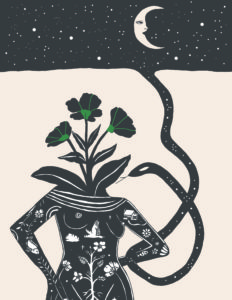I am writing to you about girls & sex.
I am writing about my first orgasm: that when I was 14 I slid the curved handle of a butter knife inside, and coming was a revelation of warming steel. I pressed my body against the cool plaster of my bedroom wall, felt powerful & ravenous.
I am writing about my first attempts with boys: sweetness, slime, a hundred wriggling fingers.
My hymen was not broken on horseback.
I was a bad Catholic girl.
I am writing about my first time: The weight of a body is coercion. What I did not call rape then, at 15. Can I call you now by your true name? Beer, whispered pleadings, my head thudding against the dresser. The weight of his body blocking out breath.
You say no until you say yes, either with a word or with a softening of resistance in the body. You relent. Or you don’t.
You contain yourself until it’s no longer safe to keep.
Exhaustion:
All you fellows climbed me like a staircase / wore me down / smooth from footfalls / wore me down1
I wanted to make myself useful. I wanted to feel burnished. And holy.
Am I writing to you about girls & sex to make you uncomfortable?
Yes. I am writing to remind you that comfort is a luxury.
Girls, can we afford it?
I am writing to give you a feeling of edgy, sustained nausea.
The girls, arriving to be exorcised, are placed on a bench, heads resting on a pillow, hands in handcuffs which are broken easily with the least effort, and they are bound to the bench with two straps across the legs and stomach. Altogether, it gives the impression that lions are being enchained. But, as soon as the demon appears, they untie the girls and let them completely free, so that they are bound as girls and released as demons.2
And I am writing out this girl inside me, as she chafed against her bonds. I am writing as the daughter of my desire continues to hesitate on the threshold of existence—and wisely so, because this world. I am writing to begin to open up a hollow in which she may someday dwell. I am writing because many women I know have experienced sexual violence, and we have no language yet in which to tell each other, no hope of holding each other.
Whose silence is this? And whose responsibility?
I write in response to Amanda Ackerman’s essay “If We Are Ever” and her question:
Are [women] starved for the present moment? Restricted from it? …
So I return to the theme of the compromised body: in this instance, a body that might not be able to take up space-time in what we call the present. A body that is concerned with the past, the future, the spectral, the other-worldly, the infinite return. A body that is concerned with making the world better than what it currently is. A body that feels itchy, unformed, and uncomfortable within the scope of the Gregorian calendar.3
I long for the pleasures of this earth that can only be known as a body in time: to nurse a baby, to paint the screen doorframe with tendrils of green. To fill the pail with mulberries, stain my fingers, make pie. I can’t help it. I want a simple life.
And yet this girl paces inside me:
Maybe if I was really bad—and not just dressed bad—I would have said no. I would have pulled the no up from deep inside of the earth where it was surging, muffled, tenacious. I would have growled it out of me. If I’d fought back, would I have had less trouble naming what happened through me that night?
But I was not bad enough: to strip naked of the yes that was not my yes. His yes became my yes. In permitting this, I betrayed my own body, and for many years I couldn’t live there. I am just now learning how.
We train girls, all the time, to say yes when they want to say no. Smile, we say to her. Give us a hug. We pat her smooth rosy cheek.4
She ran as fast as her little legs could carry her …
She never went wandering those woods again …
She always listened to her grandmother after that …
And yet all along within our girl, there’s a sub-vocal “no,” a resistance that’s gone underground: Beneath the lilting voice of the girl, smeared in the murk of her mascara, stuffed in her tiny bra, there’s another way of being. There’s a barely concealed power hungry to emerge, one that could serve us all in its other-ness, cawing, calling, seeing.
I keep asking: If the girl’s “no” has gone into hiding, then how can poetry tune our ears, help us hear this sub-vocal roar?
(The lions are us.5)
This is why I write. I want to excavate the voice that got buried in my chest that night. Not just mine, yours too. Not just ours, the animal’s too. The earth’s too. I want to hear us.
Stories matter. Many stories matter. Stories have been used to dispossess and to malign, but stories can also be used to empower and to humanize. Stories can break the dignity of a people, but stories can also repair that broken dignity.6
I’m not speaking only of sex & girls, but I am speaking of sex & girls as one expression of our malady.
I’m speaking what my girl already knew:
Silence does not imply consent. Time does not make a dent. Without her own true yes, there’s no self to speak of, or from. My yes is tied in with the yes of the collective, and if I don’t honor it, I’m not the only one who suffers. Conversely, when I honor my yes or my no, pleasure ripples out from me and suffuses my whole biome.
 And sometimes pleasure makes a dent. When I can feel my body scream yes to a decision, an experience, a person, a place, then I do it. Every time I do, and every time I say no when I mean it, I feel a pleasure cell displace a rape cell. I feel a sense of homecoming and, yes, a peace in the present moment. As of now: I step in and out of time. Sometimes I can stand to be here. And sometimes my glory goes back underground until it is safe.
And sometimes pleasure makes a dent. When I can feel my body scream yes to a decision, an experience, a person, a place, then I do it. Every time I do, and every time I say no when I mean it, I feel a pleasure cell displace a rape cell. I feel a sense of homecoming and, yes, a peace in the present moment. As of now: I step in and out of time. Sometimes I can stand to be here. And sometimes my glory goes back underground until it is safe.
I, revolt, rages, where am I to stand? What is my place if I am a woman? I look for myself throughout the centuries and don’t see myself anywhere.7
I have asked the question: What other reality, what other place could receive me? And I have come back here with my hands spread wide, empty, gleaming. Perhaps the choice to make my home right here in this moment is inevitable and revolutionary all at once. Home: I daresay hearth. In the sense that a flame of passion—and sometimes rage—is a hearth.
In the sense that this conflagration could receive you too. You might come and sit with me in its terrible, gorgeous light and warmth, and together we might accept the responsibility of seeing our selves reflected in each other: the girls in us, the immanent pleasure in our yes, the indelibility of our no.
The lions we ever are.
1 CocoRosie, “Tears for Animals,” from "Tales of a Grasswidow"
2 Helene Cixous and Catherine Clement, "The Possession of Loudun," from "The Newly Born Woman," page 11
3 Amanda Ackerman, “If We Are Ever,” The Poetry Foundation
4 Vanessa McGrady, “Why I Will Never Tell My Daughter to Give You a Hug,” Jezebel
5 Catherine Clement, "The Newly Born Woman," page 12
6 Chimamanda Ngozi Adichie, “The Danger of a Single Story,” TED Talk
7 Helene Cixous, "The Newly Born Woman," page 75
Photos (top to bottom) by Emilio García via Flickr (cc), Alba Soler via Flickr (cc), and Jeronimooo via ViewBug






